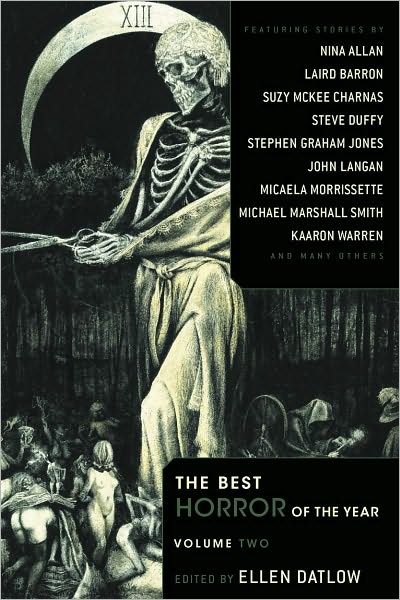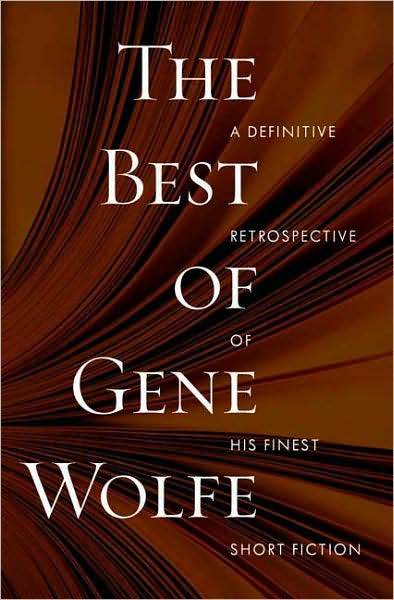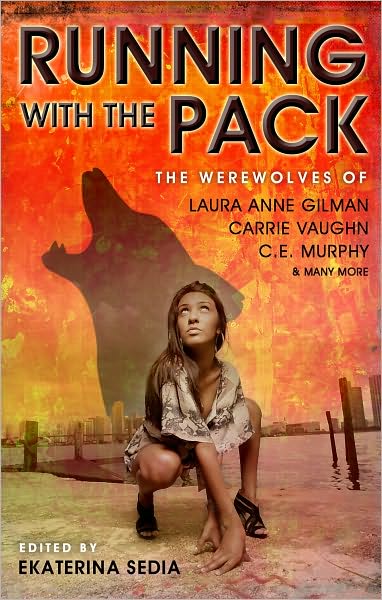I had a surreal moment at my bookstore day-job recently: a regular customer whom I am accustomed to recommending urban fantasy books and various and sundry SF came in to shop. She was looking for Carrie Vaughn things, and I suggested to her a few anthologies with Vaughn short stories, because the customer already had all of her books.
She said to me, “Oh, I don’t buy those. I don’t like short stuff.”
I was baffled. Visibly, I imagine, because she gave me an odd look. I couldn’t help but argue back that no, really, she was missing out on so much! She did not agree. I probably shouldn’t argue with customers about their reading preferences, but… really? I had finally met one of those people that writers and publishers bemoan—the ones who won’t buy short fiction. How many more of them are there, I wonder? I always hear that the short story is dying and the anthology is an unsalable format, but I can’t quite believe it.
Certainly, our store in the past year has seen a huge uptick in sales of anthologies in the SFF section. I know for a fact that we’ve been sent more of them from our suppliers: in the first year I worked at this bookstore, I had to special-order every single anthology I wanted. We didn’t receive more than one or two. (I work for a Waldenbooks, and so our stock is pre-decided by the Borders buyers.)
This year, on the other hand, we’ve received one or two new anthologies every couple of weeks. Of course, we’re only being sent one or two copies of these new anthologies—one of which generally goes to me, sorry customers—but we’re getting them. And we’re selling them out, generally. This must be true company-wide, or else they wouldn’t send us any more; after all, one tiny Kentucky store hardly affects the overall sales trends enough to skew what they decide to buy. Ergo, Borders must be selling more anthologies, and more anthologies seem to be coming out.
The overall quality seems to be higher, too. Out of the eleven or so anthologies I’ve read cover-to-cover so far this year, I’ve thoroughly enjoyed all of them. (I’m still working my way slowly and with pleasure through a few, like The Year’s Best Science Fiction—I prefer to read both a novel and an anthology at the same time, so the anthologies take longer.) The increase of attention to inclusiveness, diversity and exploration of more than just “my angst, let me show you it” has definitely pleased me; maybe my selections have skewed my opinion, but most of the things I’ve read have been fairly representative of the variety of people in SFF.
I think there are definitive, traceable reasons for that, one of them being the internet and interactive fandom. When an anthology does things like include no women or people of color, etc.—people notice, and people say something. The availability of easier online publishing with a huge readership and cheaper production costs has introduced so many new writers to audiences who wouldn’t have seen them otherwise. Our own Tor.com, for example, has been responsible for publishing some great stories in the past two years that have gone on to win awards, show up in best-of anthologies, you name it.
 The rise of smaller publishers to prominence in chain bookstores contributes, too. Night Shade and Prime Books both publish a large amount of anthologies, themed and not. I’ve been impressed consistently with the quality of Night Shade’s work—John Joseph Adams is a talented editor and he has a way of grouping stories that really works for me. They’ve also picked up a Datlow-edited Year’s Best Horror to make up for her discontinued series, Year’s Best Fantasy and Horror. Prime has picked up some of the slack in publishing Best-of anthologies: they offer both a Year’s Best Fantasy and Science Fiction and a Year’s Best Dark Fantasy and Horror now. Not to mention, Prime is as of this year publishing a Hugo Award Showcase (of the 2009 Hugos, I have hopes that next year there’ll be a second edition), and that seriously gains my appreciation. While most of the stories are available every year online, being able to buy an actual showcase is fantastic. (They also published The Bone Key by Sarah Monette, an absolute all-time favorite of mine, reviewed here.)
The rise of smaller publishers to prominence in chain bookstores contributes, too. Night Shade and Prime Books both publish a large amount of anthologies, themed and not. I’ve been impressed consistently with the quality of Night Shade’s work—John Joseph Adams is a talented editor and he has a way of grouping stories that really works for me. They’ve also picked up a Datlow-edited Year’s Best Horror to make up for her discontinued series, Year’s Best Fantasy and Horror. Prime has picked up some of the slack in publishing Best-of anthologies: they offer both a Year’s Best Fantasy and Science Fiction and a Year’s Best Dark Fantasy and Horror now. Not to mention, Prime is as of this year publishing a Hugo Award Showcase (of the 2009 Hugos, I have hopes that next year there’ll be a second edition), and that seriously gains my appreciation. While most of the stories are available every year online, being able to buy an actual showcase is fantastic. (They also published The Bone Key by Sarah Monette, an absolute all-time favorite of mine, reviewed here.)
While they’ve both had, shall we say, a bit of public misbehavior in recent years regarding their contributors, they’re also providing an outlet for short fiction that’s been extremely useful for many readers. As far as quality of production, Night Shade outstrips Prime, who are prone to typographical errors and formatting mistakes that lose them brownie points with me. (I do love the fact that they’re publishing these anthologies and I absolutely think they’re worth buying and supporting, but I’d also like a bit more attention to the simple polishing aspects of the job—page break errors and typos aren’t cool.)
Outside of Best-ofs, I’ve read some excellent themed anthologies this year. Far and above a favorite of mine is Ekaterina Sedia’s Running with the Pack, which is one of the most subject-diverse anthologies about werewolves I’ve ever seen. Queer werewolves, young and middle-aged and old werewolves, werewolves with varying economic situations, bad werewolves and good werewolves, werewolves of color—it was quite the experience. The Sedia anthology makes a point of the fact that an editor doesn’t have to “force” diversity as some people have badly, badly attempted to argue in the past. It’s not about forcing, and diversity only made the anthology better, more rich and awesome. (End soapbox.) Not to mention, it ended on one of the saddest stories I’ve ever read and left me dejected for hours. That’s actually a good thing, if you were wondering.
 Not to stop there, either: it’s been a good few years for single-author collections, as this year’s World Fantasy nominees can attest. Peter S. Beagle and Gene Wolfe both recently had collections come out, and I’m so torn about which to vote for. They’re both great. The Best of Gene Wolfe is a gorgeous hardcover (also available in trade paperback now, but mine is hardcover) from Tor. So, don’t let me steal the attention from the big presses when it comes to anthologies. They’ve been doing the work, too.
Not to stop there, either: it’s been a good few years for single-author collections, as this year’s World Fantasy nominees can attest. Peter S. Beagle and Gene Wolfe both recently had collections come out, and I’m so torn about which to vote for. They’re both great. The Best of Gene Wolfe is a gorgeous hardcover (also available in trade paperback now, but mine is hardcover) from Tor. So, don’t let me steal the attention from the big presses when it comes to anthologies. They’ve been doing the work, too.
(A side-note: I special-order stocked the trade of the Gene Wolfe collection at my store, expecting only the other employees to buy it, and a very excited man brought it up to the counter thanking us profusely for carrying it. Apparently, he’d been trying to find a copy in a store for months. I still get a pleased glow thinking about that, really. There are many perks to working in a bookstore, namely the shared joy of uniting someone with their perfect book, which you can’t get anywhere else.)
And that’s just a few of the anthologies I’ve read and loved this year.
The short story really is a careful, twisty, wonderful art-form entirely different from the novel. I hope the first customer I told you about in this post eventually changes her mind—she really is missing out on all this bounty. In the meantime, I just thought I’d share with you a little bit of my love-affair with anthologies.
So, here’s the call to arms that one obligatorily has to include in any post about great books: go buy an anthology sometime soon. Support the editors collecting them, the writers contributing to them, and the publishers who are taking the leap and putting them out. Support your local bookstores, even the chains, if you see them carrying anthologies.
If we buy them, more will come.
Lee Mandelo is a multi-fandom geek with a special love for comics and queer literature. She can be found on Twitter and Livejournal.










